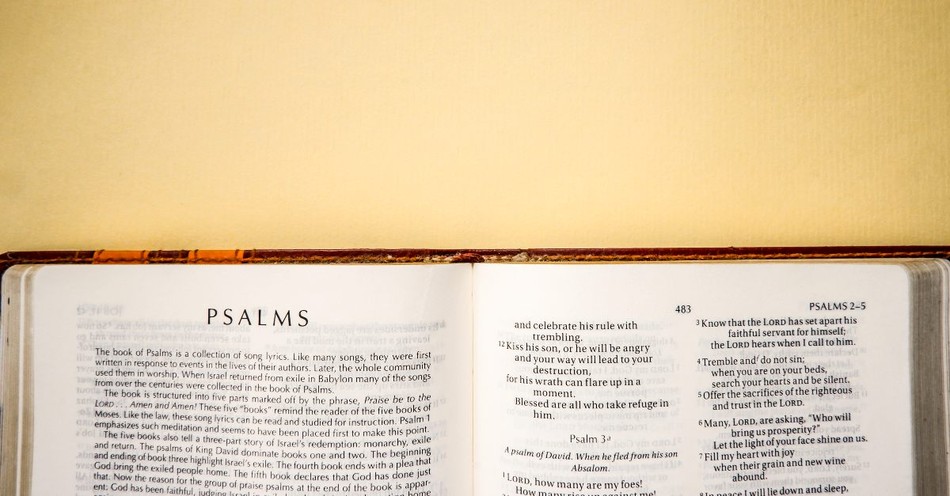We often think of the Psalms as the ancient Jewish and ancient Christian songbook. Yet today tens of millions of people can readily cite their favorite psalm. Throughout two millennia, the psalms of David have remained especially dear to the hearts of the Church.
Until the proliferation of Christian hymn books in the eighteenth and nineteenth centuries, many branches of the Church used the Psalter almost exclusively for public worship (Psalms 1-150).
What Is the Book of Psalms?
Contrary to popular opinion, however, most psalms are gritty, emotional, and in the moment. Gritty, because seven in ten speak about the author’s worst days. Emotional, because we find every emotion under the sun. In the moment because they’re largely uncensored.
In addition to David, at least six other authors contributed to the Book of Psalms, including Solomon (Psalms 72 and 127), Asaph (12 psalms), the “sons of Korah” (11, including Psalm 88, which is attributed specifically to Heman the Ezrahite), and Ethan the Ezrahite (Psalm 89).
Unlike David and other ancient psalmists, though, one author and his one psalm seem terribly out of place. The author wrote his psalm hundreds of years before young David penned the most memorized, quoted, and beloved psalm of all.
That beloved psalm, Psalm 23, draws on David’s extensive experience serving as his family’s shepherd. Then again, that “Lord is my shepherd” theme only goes through verse 4.
The final two verses of Psalm 23 draw from David’s deep yearning to attend a royal banquet with the Lord and live in His presence, in Jerusalem, for the rest of his life. It’s a jarring juxtaposition ― yet the Lord remains David’s central focus from beginning to end. And, more importantly, how prophetic!
Like Psalm 23, it features a jarring juxtaposition and, more importantly, is remarkably prophetic. I’m talking about Psalm 90. Why does a prayer by Moses, of all people, show up three-fifths of the way through a book otherwise full of psalms written hundreds of years later by David and his associates?
Let’s not forget that psalms appear elsewhere in Scripture, including Exodus 15 (penned by Moses) and Deuteronomy 32 (again penned by Moses). The first praises the Lord for the dramatic Exodus from Egypt through the Red Sea.
The second, written right before Moses died 40 years later, again praises the Lord and speaks both historically and prophetically about God’s relationship with His less-than-perfect people.
Why Is the Prayer of Moses in Psalms?
Still, why does a prayer by Moses show up outside of his largely autobiographical writings from Exodus through Deuteronomy?
And why are there no other psalms by Moses and his associates, including Joshua and Caleb?
And, why are there no psalms by Othneil, Ehud, and others who served as Israel’s judges? They served for hundreds of years after the death of Joshua until David is anointed king, yet none of their songs appear in the Book of Psalms.
Just a single prayer by Moses.
Using the internal historical and literary evidence within Genesis, Exodus, Leviticus, Numbers, and Deuteronomy, it’s safe to say that Moses wrote all five books after age 80 (when God called him) and no later than age 120 (when he died). Deuteronomy 31:2 and 34:7 specifically say that Moses finished writing his fifth book shortly before he died.
So, it’s often assumed that Moses wrote Psalm 90 during that same time span (again, after God called him but before he died 40 years later). Using the internal evidence within Psalm 90, however, can we get a better idea of how old Moses was? Thankfully, the answer is yes!
First, you will want to notice the allusions that Moses makes in Psalm 90 to the basic facts about the Creation and the Flood accounts and Israel’s early history. With the word “our” (v. 1), Moses identifies with his people. With the phrase “all generations” (v. 1), Moses hints at the literary structure of Genesis.
With his poetic references to Creation (v. 2), Moses foreshadows Genesis 1–2. With the word “dust” (v. 3), Moses foreshadows Genesis 2:7 and 3:19. With the phrase “thousand years” (v. 4), Moses foreshadows Genesis 5:27. With the word “flood” (v. 5), Moses foreshadows Genesis 6-9.
Second, you want to ponder what Moses says in verses 10 and 13. In saying, “Our days may come to seventy years, or eighty, if our strength endures” (v. 10) Moses directly suggests that he’s somewhere near that stage of life.
Then with his pleading question, “How long will it be?” (v. 13) Moses foreshadows Genesis 15:13 and Exodus 1, asking why the Lord hasn’t yet stepped in yet to free His people from their terrible bondage in Egypt.
The bottom line is, Moses probably was about 80 years old when he wrote Psalm 90. Finally, his heart was ready. The Lord then appeared to Moses in the burning bush (Exodus 3-5) and the rest is history!
Your response? First, I invite you to join me in this prayer:
Yes, Lord, I see that You’re waiting for me to have a ready heart before You call me into a new stage of life, and possibly into my greatest purpose here on earth. I’m ready.
How Can the Psalms Be So Personal?
Growing up, I owned the Psalms, reading and re-reading them, day-in and day-out, until my sophomore year of high school, I’d memorized nearly 50 of them. Yes, I’m an outlier. Probably because my name is David. Yet one of my all-time favorite psalms is Psalm 90 written by Moses. What truths. What longing. What desperation. And how prophetic of the next 40 years of his life.
When I fully committed my life to Jesus Christ as a teenager, my pastor was loving, grace-filled, and conservative. One Sunday, the Holy Spirit broke through. My pastor interrupted his sermon to speak encouragement over me.
He had been preaching from John 6:8-9 about the boy who gave his sack lunch to Jesus. He stopped, looked across the large congregation, and then likened that boy to me — that I would be used by God to feed untold thousands with the Word of God.
That exactly matched the deep longings of my heart. In fact, I had already started writing and publishing short articles. Still, what a shock to hear my pastor echoing them back to me. God did fulfill the desire in my heart as I reach readers around the world.
No wonder Paul says, “Do not treat prophecies with contempt” (1 Thessalonians 5:20). David’s inspired longings in Psalm 23 proved true through the Holy Spirit. So did Moses’ in Psalm 90.
A Closing Prayer
What longings has the Holy Spirit put on your heart? Write them down. Pray over them. Review them from time to time. And then over the years, keep trusting the Lord’s wonderful providential guidance. If God can use an ordinary guy like me, He certainly can use you!
For further reading:
5 Encouraging Psalms to Give Hope in Difficult Times
What Are the Penitential Psalms?
What Are the Psalms of Praise?
‘The Lord is My Shepherd, I Shall Not Want’ — Meaning of Psalm 23 Explained
What Does the Imagery of ‘My Cup Runneth Over’ Mean in Psalm 23:5?
Photo Credit: ©iStock/Getty Images Plus/Christiane Lois Dating




.jpg)